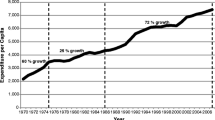Abstract
This paper documents the types and amounts of aid exchanged between adults and their non-coresidential parents. Data for the study are drawn from a representative national sample survey of Americans age 19 and older conducted in 1987–1988. Exchanges of monetary and material resources, childcare, household assistance, and companionship and advice are considered.
Patterns of intergenerational exchange are found to differ by gender, family structure, age, ethnicity, and socioeconomic situation. Differences in exchange between males and females and between whites and Mexican-Americans are related to other life-course characteristics, and to the availability and proximity of kin. Blacks and persons living in poverty are shown to be less involved than other groups in intergenerational exchanges. Finally, patterns of prior assistance and the available needs and resources of the respondents and their parents are found to influence current patterns of exchange.
Similar content being viewed by others
References
Cantor, M. H. 1979 The Informal Support System of New York’s Inner City Elderly: Is Ethnicity a Factor? InEthnicity and Aging: Theory, Research and Policy, D. E. Gelford and A. J. Kutzik, eds. Pp. 153–174. New York: Springer.
Chatters, L. M., R. J. Taylor, and J. S. Jackson 1986 Aged Blacks’ Choices for an Informal Helper Network.Journal of Gerontology 41:94–100.
Gouldner, A. W. 1960 The Norm of Reciprocity: A Preliminary Statement.American Sociological Review 25:161–178.
Hofferth, S. 1984 Kin Networks, Race, and Family Structure.Journal of Marriage and the Family 46:791–806.
Hogan, D. P., L. Hao, and W. L. Parish 1990 Race, Kin Networks, and Assistance to Mother-Headed Families.Social Forces 68:797–812.
Lancaster, J. B., and C. S. Lancaster 1987 The Watershed: Change in Parental Investment and Family Formation Strategies in the Course of Human Evolution. InParenting across the Life Span: Biosocial Dimensions, J. B. Lancaster, J. Altmann, A. S. Rossi, and L. R. Sherrod, eds. Pp. 187–206. Hawthorne, NY: Aldine.
Lee, G. R. 1979 The Effects of Social Networks in the Family. InContemporary Theories about the Family, W. R. Burr, R. Hill, F. I. Nye, and I. L. Reiss, eds. Pp. 27–56. New York: The Free Press.
Litwak, E., and S. Kulis 1987 Technology, Proximity, and Measures of Kin Support.Journal of Marriage and the Family 49:649–661.
Mindel, C. H. 1980 Extended Familism Among Urban Mexican Americans, Anglos and Blacks.Hispanic Journal of Behavioral Sciences 2:21–34.
Morgan, J. N. 1982 The Redistribution of Income by Families and Institutions and Emergency Help Patterns. InFive Thousand American Families, vol. 10, M. S. Hill, ed. Pp. 1–59. Ann Arbor: Institute of Social Research.
Mutran, E. 1985 Intergenerational Support Among Blacks and Whites: Response to Cultural or to Socioeconomic Differences.Journal of Gerontology 40:382–389.
National Survey of Families and Households (NSFH) 1988 Machine Readable Data Set, Release 1.0. Larry Bumpass and James Sweet, Principal Investigators. Madison: University of Wisconsin.
Preston, S. H. 1984 Children and the Elderly: Divergent Paths for America’s Dependents.Demography 21:435–458.
Shanas, E. 1979National Survey of the Elderly. Report to the Administration on Aging. Washington, DC: Department of Health and Human Services.
Stack, C. 1974All Our Kin: Strategies for Survival in the Black Community. New York: Harper and Row.
Taylor, R. J. 1986 Receipt of Support from Family Among Black Americans: Demographic and Familial Differences.Journal of Marriage and the Family 48:67–77.
1988 Aging and Supportive Relationships among Black Americans. InThe Black American Elderly, J. Jackson, ed. Pp. 259–281. New York: Springer.
Turke, P. W. 1989 Evolution and the Demand for Children.Population and Development Review 15:61–90.
Troll, L., and V. L. Bengtson 1979 Generations in the Family. InContemporary Theories about the Family, vol. 1, W. R. Burr, R. Hill, and E. I. Nye, eds. Pp. 127–161. New York: The Free Press.
Watkins, S. C., J. Bongaarts, and J. A. Menken 1987 Demographic Foundations of Family Change.American Sociological Review 52:346–358.
Author information
Authors and Affiliations
Additional information
Support for this research was provided by NICHD Grant No. 1 R01 HD26070-01, “Intergenerational Exchanges in Families with Children,” Dennis P. Hogan, Principal Investigator. Funds for the computer analysis were provided by the Pennsylvania State University Intercollege Research Programs.
David Eggebeen is an Assistant Professor of Human Development in the Department of Human Development and Family Studies and a research associate at the Population Issues Research Center at Pennsylvania State University. He trained in sociology and demography at the University of North Carolina. His current research interests, besides those related to intergenerational relations, are the recent changes in the demographic structure of childhood in America and their implications for children’s social and economic well-being.
Dennis P. Hogan is a professor of sociology and the director of the Population Issues Research Center at Pennsylvania State University. His current research interests, besides those related to intergenerational relations, are in the interrelation of social structures and the demographic life course. He is coauthor with David I. Kertzer ofFamily, Political Economy, and Demographic Change: The Transformation of Life in Casalecchio, Italy, 1861–1921, University of Wisconsin Press, 1989.
Rights and permissions
About this article
Cite this article
Eggebeen, D.J., Hogan, D.P. Giving between generations in American families. Human Nature 1, 211–232 (1990). https://doi.org/10.1007/BF02733984
Received:
Accepted:
Issue Date:
DOI: https://doi.org/10.1007/BF02733984




